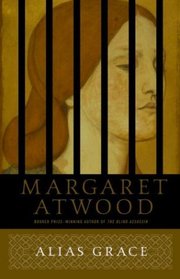Helpful Score: 18
Without the mesmerizing plot of _The Handmaid's Tale_, this novel is a bit more difficult to get into. However, once you're introduced to the character, see how she presents herself, and then hear of her heinous crime, you'll want to read more.
Atwood made me question the strategy of victimhood throughout this novel: If you *are* guilty, do you keep quiet and play the victim of wrong place/wrong time? If you're not, do you remain silent for the same reason?
I felt unsatisfied with the ending, but you'll have to read it to judge for yourself. After all, there is a whole lot of judging going on in this novel. Recommended for a literary novel fan with a strong stomach.
Atwood made me question the strategy of victimhood throughout this novel: If you *are* guilty, do you keep quiet and play the victim of wrong place/wrong time? If you're not, do you remain silent for the same reason?
I felt unsatisfied with the ending, but you'll have to read it to judge for yourself. After all, there is a whole lot of judging going on in this novel. Recommended for a literary novel fan with a strong stomach.
Helpful Score: 7
Absolutely compelling psychological/crime drama based on a true story that happened in Canada in the mid 1800's. A woman is accused of murder and sentenced to life in prison. She claims that she can't remember the crime. A young psychology student begins interviewing her to try to get to the truth and she tells the story of her life. Grace is such a likeable character that you can't help but feel empathy for her plight and I found myself skipping ahead a few pages because I wanted to know what was going to happen next so badly. It's really a fantastic book for crime fans or history fans.
Helpful Score: 6
Reworking and fictionalization of a real historical event/person, about Grace Marks, an Irish immigrant maid who was convicted along with a male servant in the same household of killing her master and the housekeeper, who was also the master's paramour. This took place near Toronto, Canada in the mid-1800's. Partly told about Grace, partly told about a psychiatrist interviewing Grace extensively many years after the fact. Interesting story, but I found it quite draggy and drawn-out in some places and found myself muttering, âget ON with it, already!â many times. Yet the story itself was interesting enough to keep me reading, and I'm not sorry I finished it.
Helpful Score: 4
If you have not had the pleasure of reading Atwood, you should do so immediately. This book was quite good, interesting historical elements, really interesting characters and plot. I am re-reading Atwood's other books now because I remember how much I enjoyed most of them the first time around.
Helpful Score: 2
While Im not all that familiar with Canadian writers, if Alias Grace is any indication of what Ive been missing by not reading more of Margaret Atwood, then I fully intend to go back for more. This novel had a lot going for it to begin with Atwood is obviously a talented writer with a knack for telling a compelling story. At the same time she expects the reader to do a fair share of the work as well. In this case were introduced early on to the fact that a terrible crime has been committed, but were not so sure that the woman who has been convicted of it really is guilty. Or (and here things get even more interesting) if she is guilty, was she really aware of what she was doing? Was she an unwilling partner in a crime she didnt want to commit but was forced to assist with in order to save her own life? Her story unfolds layer by layer and along the way we meet a cast of intriguing characters each of whom play an important part in helping us learn more about Grace and why she was imprisoned. Especially noteworthy is the character of Dr. Simon Jordon, a young doctor whose initial interest in Grace stems from his interest in new methods of treating persons with mental illness. Even though the novel was based on events that actually took place (there really was a Grace Marks who was tried for the murder of Thomas Kinnear and Nancy Montgomery in 1843, sentenced to prison, ended up in the lunatic asylum for a while and was eventually granted a pardon) what I enjoyed the most about the book had to do with the way Atwood developed the plot through the eyes of the characters and the relationships they had with one another.




![header=[] body=[Get a free book credit right now by joining the club and listing 5 books you have and are willing to share with other members!] Help icon](/images/question.gif?v=5fea88b8)
